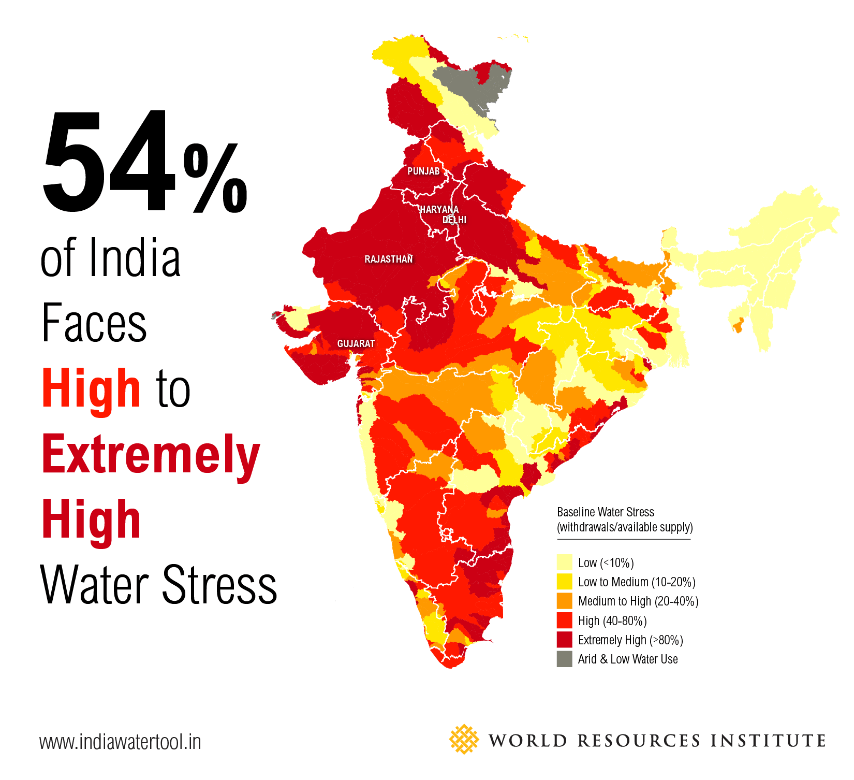The best thing about solar energy is that it can address the most basic requirements of leading a healthy life. When we talk about the most basic requirements, “water” tops the list. So here is our next CSR idea – Solar Drinking Water Solution.
Why should you consider the Solar Drinking Water Solution project as your next CSR initiative?
- India’s water sources are prone to contamination. According to statistics, almost 77 million people across India lack access to safe drinking water.
- India ranked 120th in a survey of 123 nations on the safe water index by UNDP. This is because people in urban and rural areas are affected by water-borne diseases, primarily children.
- According to World Bank reports, 21% of communicable diseases in India are due to unsafe water.
- The death toll due to diarrhoea is 1600 per day.
The data on water and the related challenges will be clear with these visual data.
The map below illustrates competition between companies, farms and people for surface water in rivers, lakes, streams, and shallow groundwater. (http://www.wri.org/blog/2015/02/3-maps-explain-india’s-growing-water-risks)

The IWT 2.0 measures water quality with an Indian-government standard called the Bureau of Indian Standards (BIS). Surface and groundwater are both below par in many areas. (http://www.wri.org/blog/2015/02/3-maps-explain-india’s-growing-water-risks)

Solar drinking water solution initiative
This project deals with an integrated community-based intervention on water issues in urban and rural areas. It provides a low-maintenance and low-cost solar drinking water solution using a solar-powered pump that draws water from nearby lakes or groundwater into a storage tank. This water is then added to a filtration unit, which does not require power but uses water pressure to operate. The filtered water is collected in a collection tank connected to community taps where people can collect drinking water. The plant runs entirely on green energy without the support of grid electricity.

This project will have a widespread impact. We have listed a few of the benefits –
- The filtration unit is easy to clean and maintain. Once the solar drinking water solution project is initiated, the community can be taught how to operate it. Installation and handover processes are easy. Unlike conventional filters that require energy, this one is easy to run. Turning a few knobs is all it takes to clean the filter.
- In villages where we have implemented the solar drinking water solution project, there has been a decrease in diseases, especially water-borne diseases, skin diseases and infections, thereby improving the personal hygiene and per capita income of the community.
- The children in these communities are healthier, enabling them to attend school regularly.
- The women in the community do not have to travel far to collect water; hence, they can save time for other activities.
- This project is based on a low-carbon initiative. It reduces emission footprints and promotes the use of renewable energy through community-based intervention.
We have executed similar solar drinking water solution projects across the country. Let’s see the viability of the project –
A long-term solution – Apart from the initial investment on this project, no further costs are incurred, as the maintenance costs are negligible, making it a long-term solution to many problems in the community.
Easy maintenance – The filtration unit requires cleaning and servicing every 14-30 days to ensure it is in continuous operation. This can be taught to anyone from the beneficiary community and is easy to operate.
Self-sustainable – The project is self-sustainable and is handed over to the villagers to manage. Once we help them divide the responsibilities amongst themselves to ensure the proper functioning of the system, within two months, we leave the village.
Abundant supply – The filtration unit delivers up to 10,000 litres of clean water daily, depending on the water contamination levels. The units are designed for a minimum of 5 years, with an expected service life of up to 10 years.
Highly efficient – This system can filter muddy water, groundwater etc., and filtered water has a ppm level that is permissible as per WHO standards.
Check out our current functional sites located in villages of western Maharashtra. – Solar Drinking water for School, Nimbus
Please give us your feedback on this idea.
You can contact us by filling out the form below or contacting us directly.









































































